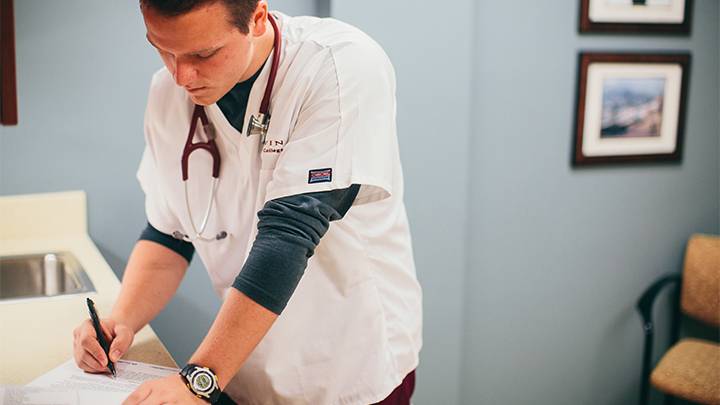Is Medicine for Me?

Becoming a doctor: a tough decision
If you're considering medicine, take a realistic look at what it takes to get there and what being a physician in the U.S. is actually like. Then, listen to God, to your own inclinations and to those around you to discern God's calling.
As Christians, we are all called to serve others, but there are many professions in which you can do so directly and vocationally—politics, church leadership, social work, psychology, education and scores of others. So why choose medicine?
Some people have known their entire life that they wanted to become a doctor. For others, making the decision can be difficult. If that's you, here are some tips to help you decide if medicine is right for you.
See what it’s really like
For a fascinating glimpse into the real-life experiences of seven doctors, see NOVA Online's special feature, Survivor M.D.
Do you have what it takes?
Here are a few things you'll need to be a doctor:
- A love for learning in general, and medicine in particular – Medicine requires broad knowledge and skill; even specialists must first be generalists.
- A strong desire to help others with their health – Healthcare is personal, and it often demands long hours and a lots of patience.
- The ability to relate with all kinds of people – Medicine deals with the needs of people of all kinds of cultures, personalities, commitments and appearances.
- The perseverance to complete the training – Becoming a full-fledged doctor takes commitment.
If you're up for this challenge, then you might be on the right track. Even more importantly, you should ask:
- How do my abilities and interests align with God’s purposes and the world’s needs?
- Even more simply: Has God created a desire in me to be a physician?
These are not trivial questions, and they aren't easy to answer either. If you're having doubts, talk to people you trust in your spiritual life and see what they say. And no matter what, pray about it.
Counting the costs
Doctors face many personal challenges along the way: concentration on your studies, discipline and organization, awesome responsibility and concern about malpractice. Medicine is a unique field and it demands a unique person.
It also takes time. It usually requires
- Four years of undergraduate studies
- Four years of medical school
- Three to six years of residency (depending on your specialty).
That’s an average of 12 years from starting college to practicing medicine.
All this can start to sound pretty daunting, especially if you're thinking about it for the first time, but there is more to the story.
Serving a strong God
If God calls you to be a physician, he will also equip you. When God creates a desire within you, he will open doors for you to follow his calling. He doesn’t call you into medicine and then close all the doors of acceptance into medical school. But that doesn’t mean you give up at the first sign of trouble. On the contrary—you should do everything you can to respond to that call: study really hard, volunteer to get the clinical experience that is necessary and much more. Those are the things that make a successful candidate for admission into medical school.
Make an appointment with one of Calvin’s premedical or dental advisors—they are excellent resources for the many students who make this decision.
More resources
American Association of Medical Colleges resources on making this decision.






